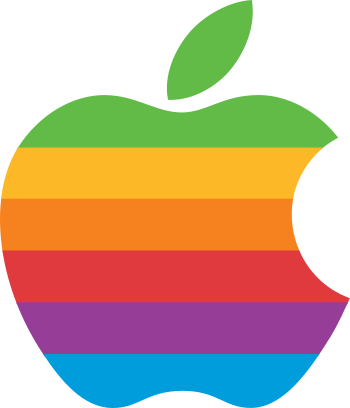
English: The logo for Apple Computer, now Apple Inc.. The design of the logo started in 1977 designed by Rob Janoff with the rainbow color theme used until 1999 when Apple stopped using the rainbow color theme and used a few different color themes for the same design. (Photo credit: Wikipedia)
What’s not to love about free?
Apple is a public company that gives away its operating system for free.
Microsoft is a public company that charges cash money for its operating system.
WebFilings is a private company that charges for its “self-filing” Securities and Exchange Commission (SEC) business reporting software.
Merrill Corporation and RR Donnelley (RRD) charge for similar products as well as traditional business reporting filing solutions that utilize proprietary software.
Apple and free, as weird as it seems, is on to something that Merrill and RRD would be wise to explore. Stay with me on this one as I elaborate on the joy of free stuff and how it benefits the overall bottom line—but only if you have enough diversity in the services and products you offer clients elsewhere.
Companies that historically have done well have at one time or another given away certain products and services (in the hopes of eventually hitting pay dirt with their flagship product offerings). In the case of traditional financial printers like RRD and Merrill (more RRD than Merrill actually), the Electronic Data Gathering, Analysis and Retrieval (EDGAR) side of the business was typically heavily discounted in the hopes of acquiring the lucrative printing and typesetting business to be had with registration work like Form S-1’s. Now that printing is no longer the huge profit machine it once was, and XBRL revenues have stepped in to compensate for at least some of printing’s lost revenues, giving away EDGAR is no longer a sound strategy in and of itself.
What companies like RRD and Merrill need to do since they have additional product offerings, is find something to give away for free in order to remain competitive. Companies like WebFilings are a one-trick pony (similar to Disk Warrior software that runs on Apple Macs and rebuilds disk directories as its only function). WebFilings smacked down RRD and Merrill for the XBRL reporting market crown with easy to use self-filing software. Both Merrill and RRD have responded by attempting to offer similar self-filing solutions, but this copycat practice should be replaced and buoyed, by utilizing a free model.
WebFilings’ software has too big a lead to be overcome for the number one spot atop the heap anytime soon. How RRD and Merrill can make gradual, progressive inroads into recouping WebFilings’ market share, and provided their self-filing offerings are at least 85-90% of the quality of WebFiling’s, is to heavily discount their versions or better yet, give them away entirely for free.
A company like WebFilings is more vulnerable to this kind of tactic than a Microsoft is to Apple and its giving away of their operating system. Microsoft will not bend to the pressures of their competition offering their former crown jewel—the Apple Macintosh Operating System, for free. Apple in fact does not even care that Microsoft feels any pressure at all to do so or not. Apple can afford to give away its operating system because it sells Macs, iPads, iPods and iPhones; its free OS is disruptive, disconcerting, even confusing, to competitors, yet ultimately results in driving customers to pay handsomely for its aforementioned products.

While RRD and Merrill may have hoped WebFilings would venture into the print side of the financial printing business at one point in time, the fact they never did nor will they ever, plays out largely to Merrill and RRD’s benefit in the long run. These two old printers should act sooner than later to reap this advantage before WebFilings begins to diversify its offerings into other spaces.
Apple, like Merrill and RRD offers tightly integrated services. In the case of Apple it is the integration of hardware and software, the elegant combination of its hardware and newly free operating system—Mac OS X Mavericks. Microsoft licenses its OS and it runs on various manufacturer PCs making quality control more difficult than Apple’s, whereas the Mac OS can only be (legally) found on Macs. Microsoft also has its still-dominant-in-the-corporate-workplace office productivity suite of software that is responsible for another good stream of revenue—again avoiding the one trick pony problems of a company like WebFilings.

RRD and Merrill are still selling their vast amounts of experience (as their principal competitive advantage) to their customer base. They would prefer to hold on to their traditional ways of executing financial reporting which is to do everything for the client from soup to nuts. If they still wish to employ this mindset going forward, however, I would suggest they could get away with heavily discounting their self-filing solutions while charging for its support.
Apple charges for support. Microsoft charges for support. WebFilings charges for support. RRD and Merrill could charge for support and give away the actual self-filing software; it could run in the cloud or on clients’ workstations—whichever they’d prefer. If self-filing software is as easy to use as WebFilings has everyone believing, competitors giving away their own versions could surely pinch one trick ponies like WebFilings going forward.
At the end of the day, you have to branch out from more than just one product or service offering in order to grow a business and keep it viable. Microsoft is struggling not because they only do Office and Windows, but because their attempts to branch into hardware have come with mixed results (Zune anyone? How about Windows phones?) But they are not going away any time soon as they continue to try to be more than Microsoft Office and Windows to its customers. Apple has made free cool—cool and scary to those considering how free might work better for them rather than their competition.

Introductory Apple 1 Computer advertisement published in the October 1976 issue of Interface Age magazine. In this issue also had an article titled “Interfacing the Apple Computer” by Steve Jobs. This described how to connect the Southwest Technical Products PR-40 printer to an Apple 1. (This same ad was also in the September issue.) Note the computer pictured is labeled “Apple Computer 1”. (Photo credit: Wikipedia)
Intuit gives away a free federal filing with its TurboTax software. It’s called throwing someone a bone. We all appreciate a bone thrown our way every so often. Apple has thrown us a bone with OS X Mavericks. RRD and Merrill would do well to throw a bone to their customers considering their self-filing provisional software. Making the basis of a competitor’s highly successful business model available free of charge, or at least heavily discounted, can be just the thing that puts a cramp in the style of a company like WebFilings.
We all hear about the wave of the future. Apple has changed everything again by offering its operating system for free. While Microsoft will not offer their operating system for free, the point they are pressured to continue to seek other business spaces outside their Office and Windows operating system software is not lost upon the casual business observer.
Some will say that Apple and Microsoft, and RRD, Merrill and WebFilings are like apples (no pun intended) and oranges. Free is where software is heading (and no matter how you look at it). People look to download free apps first on their relatively expensive smart phones. They don’t want to pay for apps unless they have to. Ironically, the fact WebFilings and Microsoft initially gained their competitive advantage on the premise of being software-only companies is just the thing that can allow more diverse, stalwart companies like RRD, Merrill and Apple to regain momentum into 2014 and beyond.

Dan
It’s a wonderful notion, Bob. One that is right on point. Unfortunately, it goes against everything that the execs in these organizations hold dear. Yes, they did “selectively” discount offerings like EDGAR on compliance documents to obtain the higher value S work and print runs. But FREE? As much as it makes sense, that word causes convulsions in these folks. A few years back, BNE offered a low-cost, low-touch service model called Pure Compliance. Customers loved the no frills, down and dirty aspect of following a few guidelines to get routine compliance documents converted and filed quickly, accurately, and cheaply. In fact, some customers were so thrilled with the PC service they tried to send non-compliance work through. CS departments would utilize PC as an internal tool to expedite customer requests. Just before the RRD acquisition, a self-service online portal (Bowne360) was introduced to further streamline the process into PC, and yes-it was free!! However, post-acquisition, RRD promptly decommissioned and dismantled Bowne360 and subsequently killed of Pure Compliance. So much for giving the customer what they want, huh?
You described in a previous post the inevitable extinction of Financial Print, again hitting the nail on the head. These are old dogs still living in the “Wolf of Wall Street” opulent past. New tricks is not in their wheelhouse – as it wasn’t for Polaroid, Digital Equipment, Woolworth and Blockbuster.
M Martin
RRD can afford to pursue a strategy like the one you suggest. Can Merrill?
Dan
They can and they should. For over a decade now, it’s hard to determine if Merrill is committed to the transactional and compliance markets. Their investment management products and service are decent and data room offering is strong. I hear the litigation business is slipped.
Employing a DIY interface into solid content and document management systems provide the transparency, accuracy and expediency customers yearn while reducing physical footprint and labor expense.
Everyone does a piece of it. No one will take the leap to revolutionize service in this space.